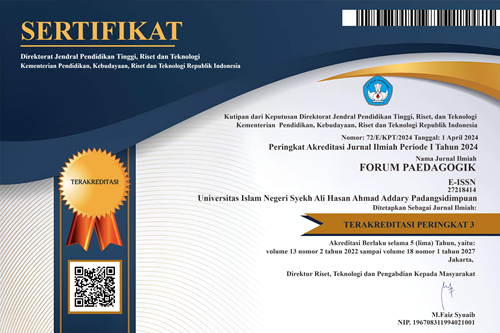Supp. File(s): Source Text
JUDGMENT VALUE ON CORRUPTION IN ONLINE NEWS: SYSTEMIC FUNCTIONAL LINGUISTICS
Exploring the judgment evaluation is conducted to see the pattern of the social sanction and its impact in giving self-reflection to readers as public figures in Indonesia through systemic functional linguistics theory: appraisal. The news text about corruption that are chosen to be analyzed are namely: Lukas Enembe case as a governor, Sudrajat Dimyati case as a judge, and Ferdy Sambo as policeman that involve in criminal case. The data are analyzed by using appraisal theory in judgment process. The data source is the three online news texts that have mentioned some criticisms to the Indonesian officials, namely: National Tempo News, National Okezone News, and Kompas News. The findings show that each news text has their own way to express the social sanction which uses high negative propriety and negative veracity. The finding is benefit to see how the news text show critical expression that can influence the readers’ emotion. The novelty is finding the pattern of judgment expressions used in three online news texts through appraisal theory but it is limited on the evaluation of judgment.
Keywords: judgment, value, corruption cases, appraisal.Abstrak
Eksplorasi nilai judgment dilaksanakan untuk mengetahui bentuk sanksi sosial dan dampaknya dalam memberikan refleksi diri pada pembaca sebagai tokoh masyarakat di Indonesia melalui teori linguistic sistemik fungsional: appraisal. Teks berita tentang korupsi yang dipilih untuk dianalisa terdiri dari: kasus Lukas Enenbe sebagai seorang gubernur, kasus Sudrajat Dimyati sebagai seorang hakim, dan kasus Ferdy Sambo sebagai seorang polisi yang terlibat kasus kriminal. Data dianalisa dengan menggunakan teori appraisal dalam bentuk proses judgment. Sumber data merupakan tiga teks berita online, yaitu Berita Nasional Tempo, Berita Nasional Okezone, dan Berita Kompas. Temuan menunjukkan bahwa masing-masing teks berita memiliki cara sendiri untuk mengekspresikan sanksi social yang menggunakan negative propriety dan negative veracity yang tinggi. Temuan ini penting untuk melihat bagaimana teks berita menunjukkan ekspresi kritis yang dapat mempengaruhi emosi pembaca. Kebaruan penelitian dalam bentuk pola ekspesi judgment yang digunakan dalam tiga teks berita online melalui teori appraisal namun penelitian ini masih terbatas pada penilaian judgment.
Kata Kunci judgment, nilai, kasus korupsi, appraisal.Supplement Files
Keywords : judgment; value; corruption cases; appraisal
Agale-kolgo, D. (2018). The Impact of Corruption on Economic Growth in Developing Countries an Econometric Analysis - An Econometric Analysis. Master’s Thesis. Erasmus University Rotterdam. Faculty of Social Sciences.
Andvig, J.C. & Fjeldstad, O.H. (2000). Research on Corruption – A Policy Oriented Survey. Report. Chr. Michelsen Institute (CMI) & Norwegian Institute of International Affairs (NUPI).
Atnan. (2014). Fenomena Korupsi Pejabat Publik di Jawa Barat. JKMP. 2(2): 103-220.
Bahoo, S., Alon, I., & Paltrinieri, A. (2020). Corruption in International Business: A Review and Research Agenda. International Business Review, 29(4), 101660. https://doi.org/10.1016/j.ibusrev.2019.101660
Batar, S. (2021). An Overview on Corruption. Asian Journal of Multidimensional Research, 10(11), 524–530. https://doi.org/10.5958/2278-4853.2021.01046.6.
Bayar, G. (2003). Corruption – A Game Theoretical Analysis. Thesis. Middle East Technical University.
Bayar, G. (2011). Causes of Corruption: Dynamic Panel Data Analysis of Some Post Soviet Countries and East Asian Countries. Journal of Applied Business Research, 27(1), 77–86. https://doi.org/10.19030/jabr.v27i1.912
Binions, O. (2018). A Study of Corruption Using the Institutional Analysis and Development Framework with an Application to the Bidding Phase of Infrastructure Procurement. Thesis. University College London.
Diansyah, F., Yuntho, E., & Fariz, D. (2011). Penguatan Pemberantasan Korupsi melalui Fungsi Kordinasi dan Supervisi Komisi Pemberantasan Korupsi. Laporan Penelitian. Jakarta. Indonesia Corruption Watch. 1–64. https://www.neliti.com/id/publications/45376/penguatan-pemberantasan-korupsi-melalui-fungsi-koordinasi-dan-supervisi-komisi-p
Dong, B. (2011). The Causes and Consequences of Corruption. Thesis. Queensland University of Technology Australia.
Farikhoh, I., & Chariri, A. (2022). Korupsi di Sektor Publik : Tinjauan Literatur Sistematis dan Analisis Bibliometrik. Integritas : Jurnal Antikorupsi, 8(1), 63–76. https://doi.org/10.32697/integritas.v8i1.866
Ghaniy, N., & Hastiadi, F.F. (2017). Political, Social and Economic Determinants of Corruption. International Journal of Economics and Financial Issues, 7(4), 144–149. http:www.econjournals.com
Henderson, J. V., & Kuncoro, A. (2004). Corruption in Indonesia. NBER Working Paper Series, 10764(August), 1–36. http://www.nber.org/papers/w10674
Hua. (2013). Corruption and Economic Growth in Transition Economics. Journal of the American Chemical Society, 123(10), 2176–2181. https://shodhganga.inflibnet.ac.in/jspui/handle/10603/7385
Loužecký, M. (2020). A Study of Corruption: The Case of Maputo Mozambique. Thesis. University of Copenhagen.
Mangafić, J., & Veselinović, L. (2020). The Determinants of Corruption at the Individual Level: Evidence from Bosnia-Herzegovina. Economic Research-Ekonomska Istrazivanja , 33(1), 2670–2691. https://doi.org/10.1080/1331677X.2020.1723426
Martin, J. R., & Rose, D. (2007). Working with Discourse: Meaning beyond the Clause. Continuum.
Mynth, U. (2000). Corruption: Causes, Consequences and Cures. Asia-Pacific Development Journal. 7(2): 33-58.
Polner. (2017). Overview of Literature on Corruption. Identity Politics of Difference, Research Paper. World Customs Organization (WCO)7, 15–48. https://doi.org/10.2307/j.ctt1vgwb85.5
Putra, N. R., & Linda, R. (2022). Impact of Social Change on Society From the Crime of Corruption. Integritas : Jurnal Antikorupsi, 8(1), 13–24. https://doi.org/10.32697/integritas.v8i1.898
Rahman, F. (2011). Korupsi di Tingkat Desa. Governance. 2(1): 13-24.
Schwickerath, A.K., Varraich, A., & Laura-Lee, S. (2016). How to research corruption? Conference proceedings. October 2017. http://nbn-resolving.de/urn:nbn:de:0168-ssoar-52393-1
Setiadi. (2018). Korupsi di Indonesia. Energies, 6(1), 1–8. http://journals.sagepub.com/doi/10.1177/1120700020921110%0Ahttps://doi.org/10.1016/j.reuma.2018.06.001%0Ahttps://doi.org/10.1016/j.arth.2018.03.044%0Ahttps://reader.elsevier.com/reader/sd/pii/S1063458420300078?token=C039B8B13922A2079230DC9AF11A333E295FCD8
Syarif, L. M., & Faisal. (2019). Addressing the Root of Political Corruption in Indonesia. Jurnal Antikorupsi Integritas, 5(2), 191–198.
Yuwanto, L. (2016). Kinerja Penanganan Tindak Pidana Korupsi Sumber Daya Alam dan Kepercayaan terhadap Komisi Pemberantasan Korupsi. Jurnal Antikorupsi Integritas, 5(2), 25–41.
 Copyright (c) 2023 Chalimah Chalimah, Heny Sulistyowati, Susi Darihastining, Maaz Ud Din
Copyright (c) 2023 Chalimah Chalimah, Heny Sulistyowati, Susi Darihastining, Maaz Ud Din

This work is licensed under a Creative Commons Attribution-ShareAlike 4.0 International License.











